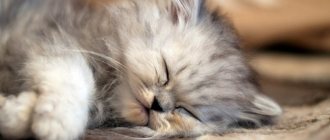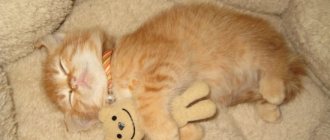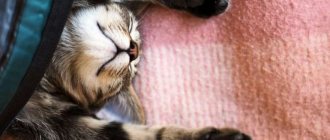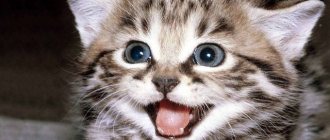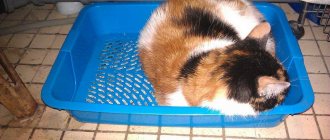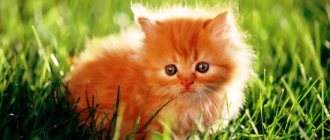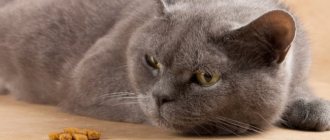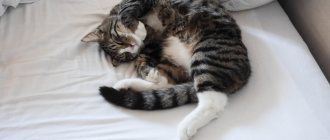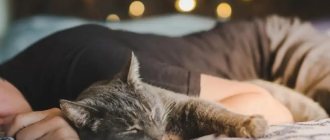Mister Cat explains why cats sleep so much
The average sleep norm for a cat is 2 and a half times higher than that of a human.
This high duration is due to the following reasons: Age. Month-old kittens and elderly pets sleep more than young and healthy individuals. Breed. Scottish and British cats may fall asleep immediately after eating. More active, for example, Abyssinians, in physical activity. Therefore, they will prefer games or contact with their owners to sleep. Condition of the body. If your cat's routine has changed - she begins to sleep a lot or, conversely, stays awake more - this may indicate health problems. It is better not to delay a visit to the veterinarian for examination and diagnosis. Accommodations. A pet may not get enough sleep if it is bothered by its neighbors
It is important that the environment does not create reasons for the animal to become agitated. This also applies to other pets.
They may need a break from each other.
When long sleep is a sign of illness
A kitten's long sleep should not cause concern to the owner. But you should be wary if, in addition to the constant need for rest, the kitten shows other signs of illness. For example, he refuses food and water, often visits the litter box, the coat becomes dull and brittle, and the temperature is elevated.
It is very difficult for the owner to determine why the kitten is feeling unwell based on these symptoms, so you need to contact a veterinarian. He will prescribe the appropriate treatment, after which the kitten’s sleep problems will disappear.
Increased drowsiness can be a symptom of diseases such as inflammation of internal organs, helminthiasis, viral infection, and the development of a cancerous tumor.
Prevention and timely diagnosis of diseases will increase the pet’s quality of life.
Stages
The pet's sleep process is divided into the following stages:
- Nap. The body remains conscious and alert during rest. In the event of an unexpected threat, the animal reacts instantly.
- Shallow sleep. The body rests, but hearing is preserved.
- Deep dream. Muscle tension disappears, short nerve impulses may be observed, due to which the muscles contract and the paws twitch.
- REM phase. The eyes move behind closed eyelids, there is a high probability of dreaming.
The first two stages last about half an hour, followed by 5-7 minutes of a deep phase, which again gives way to sleep. This alternation of stages of sleep allows the animal not to lose vigilance and control the situation around itself at all times.
The effect of cat breed on sleep duration
Cat breed has a significant impact on behavior and sleep duration. This is due to different types of higher nervous activity and temperament. Thus, easily excitable pets (mainly Oriental, Asian and Siamese-Oriental breeds) sleep a couple of hours less than the average table values.
Phlegmatic - calm cat breeds (Persian, Maine Coon, Siberian, British, Scottish, etc.) can sleep several hours longer than average.
The duration of sleep reflects the health of the pet. A caring owner should regularly monitor the pet for such violations. They are often caused by discomfort or pain.
It is especially important to monitor the sleep of newborns and growing kittens.
How long does a kitten and an adult cat sleep?
As a pet gets older, its sleep patterns change. A newborn kitten wakes up for a total of one hour a day to feed. The rest of the time he sleeps, gaining strength. The body gradually develops and requires movement and other physical activity.
The duration of sleep for a little pet depends on the following factors:
- Age. Kittens and older individuals sleep more than healthy individuals of reproductive age.
- State of the nervous system. An excited cat has difficulty falling asleep. If for some reason the cat has not fed the offspring, it will make noise and become restless. Well-fed babies usually pass out immediately after eating, warmed by their mother's fur.
- Environment. Animals need a private place to rest. Pets will sleep longer and more peacefully in a quiet apartment. If kittens are weaned from their mother, you need to provide them with a comfortable box or buy a special cat house.
An active young cat can sleep from 14 to 22 hours a day. The regime is determined by his lifestyle. Outdoor cats need to be cared for and find shelter, which takes a lot of time. In a warm apartment there are no such worries, so he can afford to bask with breaks for lunch and communication with the owners.
Why do cats sleep a lot and what determines the duration of their sleep?
To answer this question, you need to turn to the physiology of pets. In the wild, predator cats hunt to get food - they cannot afford to sleep as much as a cat living in the house sleeps.
Pets are deprived of the need to get their own food - they spend all their free time sleeping. In addition, only in a state of deep sleep do cats fully rest.
Several factors influence the length of a cat's sleep:
- Pet's age. Kittens and older cats sleep much longer.
- Cat breed. The Scots and British can go to bed as soon as they eat. The Abyssinian cat and the Ocicat have an active temperament from a young age, so their sleep duration is less.
- Health status and stress are two other factors that affect sleep duration. Sick animals and stressed cats sleep less. Their sleep is more sensitive.
- The situation in the house and the environment in which the cat is located. Restless sleep may be a consequence of the cat being scared, uncomfortable, or someone in the household bothering her greatly.
Alarm bells for drowsiness
By nature, cats are lazy and love to sleep. The pet's waking period does not last long. When an animal sleeps a lot, it does not mean that there is something wrong with it. However, if you experience the following symptoms in addition to drowsiness, you should contact your veterinarian:
- Lethargy and apathy, refusal of previously favorite games;
- Lack of appetite and reluctance to drink;
- Increased temperature, nose hot and dry to the touch;
- Pallor of the mucous membranes.
Do you like cats? Mur-mur-murNet
How and where does a cat sleep?
There is an opinion that the position and place in which a cat falls asleep speaks about its mood and attitude towards its owners. You can find the cat lying on its back with its paws comically outstretched.
In this case, it is better not to deceive the cat’s expectations and not to disturb her for no reason. Like any living creature, she needs personal space and peace.
Sleeping next to the owner, especially at night, is also considered a sign of openness and trust. True, such behavior can be interpreted as a desire to warm up.
After a hearty dinner, a domestic cat usually immediately goes to bed. For these purposes, he may choose not the most obvious places. Do not be surprised if the animal considers an empty glass vase, sink or dining table to be its bed. It is unlikely that people will ever find out what really motivates cats that fall asleep in unusual places.
Sleep as a manifestation of trust in the owner
How a kitten relates to its owner can be determined by where it sleeps and in what position. We can talk about the animal’s complete trust in its owner if he sleeps on his back, with his paws outstretched and his stomach exposed.
As for a place to sleep, pets that show love to their owner sleep with him. They are often placed at a person’s feet or near his head. At the same time, cats purr loudly, showing that they are comfortable with their owner and feel safe.
If it is observed that the pet cannot decide on a place to sleep, behaves tensely, and spends a long time looking for the most secluded places, it means that he is not confident in his safety. Therefore, it is very important to build trusting relationships with animals or not to get such pets at all.
Thus, a cat can sleep quite a few hours a day. There is nothing surprising in this, this is how nature intended. But it is still necessary to monitor your pets’ sleep, since some deviations from the average value may indicate a deterioration in well-being or the development of any pathologies.
How long do cats sleep?
Cats sleep 2-2.5 times longer than people; on average, it takes them from 14 to 22 hours for this serene activity. Their sleep is not continuous: the animal quickly falls asleep, wakes up, does its business and again plunges into the arms of Morpheus.
Why do cats sleep so much and what determines the duration of their sleep?
To answer this question, you need to turn to the physiology of pets. In the wild, predator cats hunt to get food - they cannot afford to sleep as much as a cat living in the house sleeps.
Pets are deprived of the need to get their own food - they spend all their free time sleeping. In addition, only in a state of deep sleep do cats fully rest.
Several factors influence the length of a cat's sleep:
- Pet's age. Kittens and older cats sleep much longer.
- Cat breed. The Scots and British can go to bed as soon as they eat. The Abyssinian cat and the Ocicat have an active temperament from a young age, so their sleep duration is less.
- Health status and stress are two other factors that affect sleep duration. Sick animals and stressed cats sleep less. Their sleep is more sensitive.
- The situation in the house and the environment in which the cat is located. Restless sleep may be a consequence of the cat being scared, uncomfortable, or someone in the household bothering her greatly.
If your pet is healthy, well-fed, but sleeps less than 12 hours a day and his sleep is intermittent and restless, try to find and eliminate the cause of his discomfort. You may have to build him a secluded sleeping place or simply give him more attention and affection.
How many hours should a kitten sleep?
We have already mentioned that kittens sleep longer than adults. Newborn babies can sleep for almost days, waking up only to eat.
Grown-up kittens at the age of 1 month sleep a little less - 21-22 hours. This is considered normal, because adequate sleep is necessary for the growth and development of the baby.
Therefore, it is so important to create a cozy, secluded place for the cat and kittens in order to protect the kittens’ and mother’s sleep from unnecessary intrusive attention. By the way, while the kitten is with its mother and sucks milk, its daily schedule is determined by the mother cat
Grown-up 2-month-old kittens sleep 18-20 hours a day. This is a time of active growing up. Babies begin to crawl around their mother, explore the world and play with their brothers and sisters. After another couple of months, kittens learn to run and jump - they like these activities, they stay awake for these active games.
Sleep duration of adult cats
It is difficult for the owner to say how much cats sleep per day; some people think that cats sleep constantly. In fact, healthy adults sleep less than kittens.
Their normal sleep duration is 14-16 hours.
Of course, everything is very individual and depends on the pet’s state of mind, the situation in the house, and the temperament characteristics of the breed. But, even if your adult and absolutely healthy cat sleeps for about 20 hours, this is not a reason to contact the veterinarian. The alarm should only be sounded when other symptoms are added to prolonged sleep: poor appetite, decreased activity, lethargy.
Very old cats can sleep at the level of kittens - up to 22 hours a day.
Animals wake up only to eat and go to the toilet. During this period of a pet's life, owners should be especially attentive to the health of an aging cat. Natural degenerative processes occur in the animal’s body.
How long do sick cats sleep?
Sick animals may experience changes in sleep time. Moreover, both in the direction of increasing its duration and in the direction of decreasing it.
If the cat sleeps much longer and has other negative symptoms: apathy, poor appetite, fever, diarrhea, the animal must be urgently shown to a veterinarian.
A significant reduction in sleep time may indicate thyroid abnormalities. In any case, only a doctor should make a diagnosis.
How to determine individual sleep norms for cats?
Calculating how much cats sleep may seem like an easy and simple task. But in order to obtain objective data, it is necessary to constantly monitor your pet every day for a month. Having obtained an average indicator that will not depend on the weather, the cat’s well-being or the season, you can understand how much time a furry pet spends in a dream per day. Kittens (like adult cats) are able to remain dormant for 12 to 20 hours.
In order to accurately calculate how long and how often a kitten sleeps, you must not be separated from it even for a minute. Owners will have to be patient and become more attentive to their four-legged pets.
Since the cat sleeps, as a rule, intermittently, it is important not to lose sight of him, since not only kittens, but also adult cats can rest in the most unexpected places: on the radiator, on the window, basking in the warm rays of the sun or at the feet of the owner. If you add up all the “short dreams”, the total will be the same hours that the kitten sleeps during the day.
It turns out that the longest sleep occurs in cats in different age groups. The first stage is associated with birth and development in the first 2 months. During this period, kittens sleep quite a lot, only occasionally waking up in order to refresh themselves. The second age group contains older pets. Old age is a direct reflection of blind youth in cats, so their awakening is due to the same needs for food and toilet.
